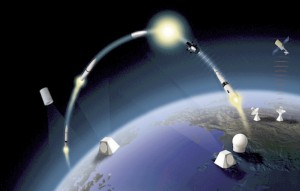Russian President Vladimir Putin has authorized, and his military forces have carried out, an unprovoked armed invasion of a neighboring nation, Ukraine — whose sole transgression was wanting closer diplomatic and economic ties with the West. Despite wide condemnation of the invasion and now the occupation of the Crimea region of Ukraine, Putin is unrepentant and China is now standing with Russia. As if the invasion wasn’t provocative enough, Putin also test-fired an Intercontinental Ballistic Missile (ICBM) only days after the invasion. These are dangerous times.
But it doesn’t stop there. Russia is helping Iran develop nuclear capabilities, giving them cover as they arm terrorists in the Middle East with missiles, and aiding Syria’s Assad cling to power despite his crimes against humanity.
For the past decade American foreign policy has mistakenly operated as if Russia and Putin were allies in making the world more secure and stable. One of Bush’s errors was to believe Putin was a responsible world leader. That was always a bad assumption.
Recent events provide irrefutable proof that we must view Putin’s Russia as a potential adversary, not a potential partner. Putin has no interest in partnering with us to promote stability and security in the world’s hot spots. Putin’s objective is to rebuild an empire and fomenting problems around the globe to distract and occupy us helps him reach his goal.
For going on six years, the U.S. has projected an unmistakeable weakness and Putin has taken note. In the first year of his presidency, President Obama cancelled plans to expand our high tech missile defense shield to Eastern Europe which would have protected both Europe and the currently unprotected eastern half of the US. Not surprisingly, our allies in Europe — even nations once aligned with the former Soviet Union — desperately wanted the United States to expand its missile defensive capabilities to Europe. This would have been a win-win.
Unfortunately, President Obama cancelled the project and left our allies in Europe stunned at his sudden reversal. At the time, that decision was unwise and predictably harmful to American interests. However, recent events have revealed that the cancellation was manifestly foolish — as was Obama telling Putin that “after my reelection, I will have more flexibility.” Obama’s consistent projection of weakness has caused our allies to lose confidence in our leadership and our adversaries to lose respect for us. All of this makes the world a more dangerous place.
If Obama hopes to avoid being forever labeled as a feckless Jimmy Carteresque foreign policy president, he must reverse course on missile defense. It is time to revive plans to build a missile defense shield in Europe. If Obama wants to send a clear and strong message to Putin that his adventurism and aggression will not go unopposed, few things would send that message as clearly and as quickly as expanding our missile defense capabilities into Eastern Europe.
Obama and future presidents will find that diplomatic solutions will be easier to reach when we are negotiating from a position of strength and when we have a credible deterrent. If Putin wants to test ICBMs, we should demonstrate that we can and will render such offensive weapons obsolete and useless.
The president should immediately announce that he will expand our missile defense capability, open a dialogue with our allies in Eastern Europe and fast track the construction of a missile defense shield and the requisite high tech radars.
This is precisely what Ronald Reagan would have done. We do not need to escalate the conflict or engage in a proxy war. Reagan simply made it clear that he intended to render their offensive weapons useless. Under the pressure he created, Soviet communism could not sustain itself. Rather than dramatically cutting our military to pre-World War II levels, President Obama should focus on maintaining a strong national defense and deploying a robust and capable missile defense shield in Europe.
. . . . . . . . . . . . . . . . . . . . .
George Landrith is the President of Frontiers of Freedom. His article was published at Human Events.
